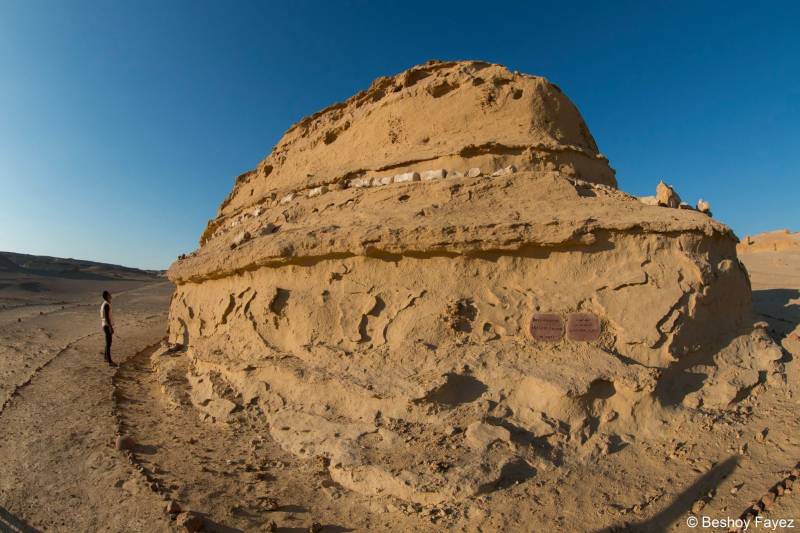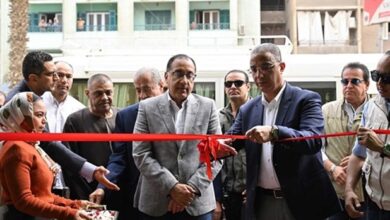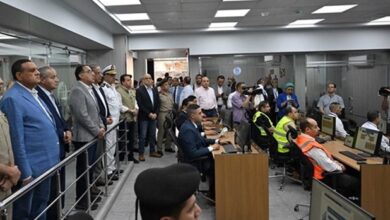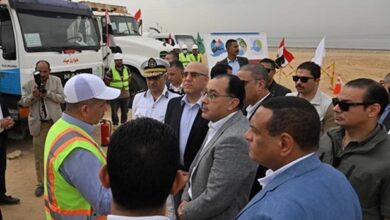Smoke from three Fayoum factories officially inaugurated last October by Egypt's de-facto ruler Field Marshal Hussein Tantawi is creating an environmental disaster, not only ruining agricultural production but also killing scores of animals, according to residents of the area surrounding the factories.
The inauguration of the factories, which produce phosphoric acid, aluminum sulfate and fertilizers in the industrial region of Kum Osheem off the Cairo–Fayoum Road, was part of celebrations for the 38th anniversary of Egypt's 6th of October military victory over Israel.
All three factories belong to the military-owned Nasr Company for Chemicals, which was established in 1975 to produce chemicals, fertilizers and household pesticides.
Tantawi's visit was the the Supreme Council of the Armed Forces (SCAF) chief's first since the 25 January uprising.
However, residents of the area say that while the factories have actually been operating for the past three years, their disastrous environmental impact has only recently become apparent.
Egypt Independent's reporter was not allowed inside the factories, and officials at the Environmental Affairs office in Fayoum denied that these factories are polluting the environment.
The pollution emitted by the factories is threatening nearby agricultural lands and has irrevocably damaged the harvests of nearly 15,000 feddans of land, according to Ibrahim Khaled Ammar, a livestock dealer who lives in the village of Asfar, located just 500 meters from the factories.
Farmers in five Kum Osheem villages have complained about the deterioration of their olive harvests, one of Fayoum's leading agricultural products. Fayoum, an oasis governorate located 76km southwest of Cairo, has a population of over 2.5 million and relies on agriculture as its main source of income.
Badawy Gomaa Mohamed, a farmer from the village of Tahoon, summarizes the problem: “People have been suffering from the factories' smoke for a year now. But following the Tantawi inauguration, the smoke has increased and my entire olive harvest is now lost.”
Mohamed Abdel Aty Sedawy, another farmer hailing from the village of Mofatesh, details the harm inflicted by the factories, explaining that all the branches on his olive trees have dried up.
"The olives should be green at this time of year, but due to the factories' smoke, all the branches are dry. This means that this harvest is not going to be sold anywhere,” he laments.
Palm trees are another of Fayoum's important crops that are regularly sold to other governorates. However, the production of hundreds of trees in villages near the industrial zone was also hindered by the smoke.
Gomaa Abdel Hady Ruby, a farmer from the village of Deeba, speaks about his ruined harvest of palm trees.
"My sole source of income is from palm trees. Recently, and for the first time ever, I don’t have a harvest to sell. All the dates are rotten; they have been cracked and damaged by the smoke from the factories. My village is 5km away from the factories but the smoke reaches us easily,” Ruby says.
When the farmers tried to obtain more pesticides to mitigate the negative effects of the smoke, they were disappointed.
"We’ve tried everything that was advised by the agricultural engineer that came to help, but the situation didn’t change,” says Mohamed, the farmer from Tahoon. “He eventually told us that no pesticide could reverse the effects of air pollution on our crops.”
The farmers say that they can deal with this year’s loss, “but we can’t afford it for two years. This is our main source of income and we can’t live without it,” complains Ruby.
Moreover, the smoke has had a negative impact on animals, which have repeatedly fainted in the area surrounding the factories. Scores of animals have also reportedly died because of the smoke.
Ammar, the livestock dealer, argues that the factories' pollution has had a harsh impact on local animals.
Pointing to two of his cows that had fainted from smoke inhalation, Ammar says, “The price of each of these cows will not reach LE1000. A healthy cow costs around LE10,000.”
The problem is chronic, Ammar adds, as livestock are a major source for income for many families in the area. He also says that cows provide families with milk and cheese, which comprise almost all of local families' meals.
Residents can also make extra money by selling fresh produce in the local village market, but their crops have been damaged. “That’s why the problem is threatening our lives here,” Ammar continues.
Farmers against the SCAF?
Ruby, the farmer from Deeba, says that Egypt’s military rulers are now turning against the people.
They are destroying us,” he angrily exclaims. “Their job is to protect us, not harm us with these factories.”
But Ammar, who has tried many times to gather the people and raise awareness about the pollution, feels constrained.
"We are poor people and most of us are not educated. People still fear the authorities. We are not in Damietta,” he says, referring to the massive demonstrations by residents of the Mediterranean governorate to protest a fertilizer plant they accuse of polluting the environment.
Fayoum residents seem unable to initiate such collective action.
"At first, some people suggested blocking the Cairo–Fayoum Road to send a message to the army. But we refused to do that because we are afraid of the consequences,” says Sedawy, the farmer from Mofatesh.
Fayoum is one of the poorest governorates in Egypt, ranking at low according to all human development indicators.
Farmers in the area recently contacted the local office of the Egyptian Environmental Affairs Agency (EEAA) but received no response. And after going directly to the office of the Fayoum governor, they were told that since the factories were military-owned, there was nothing the governor could do.
According to Sedawy, the farmers also tried to contact parliamentary candidates about the problem, but none took up the cause.
Ammar says that when Tantawi came to inaugurate the factories, some went to protest their construction.
"He promised us he would solve our problem,” Ammar recalls. “But nothing has been solved yet.”
He follows with a plea for help: “We don’t know what to do here. We are desperate and have no idea what else can be done.”




